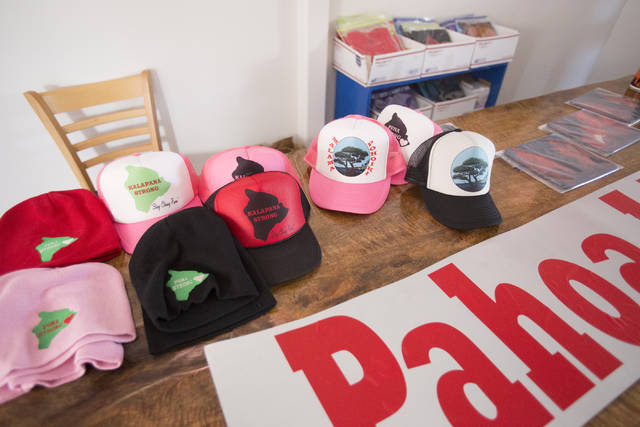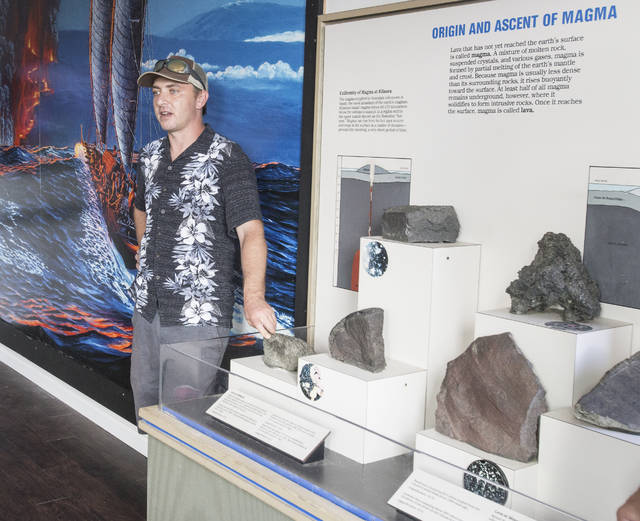Pahoa Elementary School students visit new lava museum





HOLLYN JOHNSON/Tribune-Herald Pahoa Elementary School fourth graders Asanti Ledward, 9, and Shady Morante-Rodrigues, 9

At the Pahoa Lava Zone Museum, John Stallman gives a presentation Monday to Pahoa Elementary School fourth-graders about the recent Kilauea eruption in lower Puna. (Hollyn Johnson/Tribune-Herald)

HOLLYN JOHNSON/Tribune-Herald Pahoa Elementary School fourth graders listen to a presentation about the recent Kilauea eruption, in lower Puna this year, Monday at the Pahoa Lava Zone Museum in Pahoa.
HILO — Fourth-graders from Pahoa Elementary on Monday morning were the first group of students to visit the Pahoa Lava Zone Museum, which opened Saturday.
HILO — Fourth-graders from Pahoa Elementary on Monday morning were the first group of students to visit the Pahoa Lava Zone Museum, which opened Saturday.
Wearing red T-shirts and holding composition notebooks, the two dozen students first performed a chant before making their way inside and taking a seat, ready to learn about volcanoes and the recent eruption of Kilauea, which began May 3 in Leilani Estates.
Many of the students have been affected by the lava flows, which destroyed more than 700 homes in lower Puna.
When asked by the speakers whether they had to evacuate because of the eruption, a few hands shot into the air. Later, when asked who felt the earthquakes that accompanied the eruption or saw the cracks caused by the volcanic activity, nearly all students raised a hand.
The students have been studying volcanic eruptions, said Nick Francisco, who works for Kamehameha School’s educational outreach department, Kealapono.
Kealapono aims to provide culture-based education that ties in next-generation science standards to students in the community, primarily through state Department of Education schools, he said.
“The kids ask questions,” said Francisco. “What caused the eruptions? We started with a lot of questions.”
Especially in the wake of this year’s eruption, Francisco said it’s important to study volcanic activity because of its impact.
Explosions from fissure 17 could be heard from classrooms at the end of the last school year, he said. “In May, we could hear all that. … The gas, everything. We were right there.”
And many students and teachers, Francisco included, were either displaced or lost their homes.
“So it’s … trying to teach them, why did lava come in Leilani Estates … what caused it to do that? We hear these words ‘East Rift Zone,’ what does it mean? So (we’re) trying to explore and really get them to understand how our Earth is created, especially for us here in Puna, in the heart of Pele’s aina.”
Fourth-grade teacher Gayle Enriquez said it was important to address the issues students were concerned about so they had more information and “could actually see an explanation to why it was happening.”
When it was announced that the museum would open, “we were like, ‘What a great opportunity,’ because we couldn’t take them up to the volcano,” she said. “Having (the museum) here, I think, provides an opportunity for them to go home, talk to their parents, talk to their families and say, ‘We need to come here and check it out.’
“So I think it’s going to be a great opportunity just for our community here to have closure. They can come and ask questions. I think it’s great.”
The students were excited about Monday’s learning experience, she said.
Shady Morante-Rodrigues and Asanti Ledward, both 9, were two of the students who were enthusiastic about the museum visit.
“I feel excited, and I feel like it’s fun, and I feel like I can learn a lot from over here,” Asanti said.
Shady said it was “cool” that guest speakers were “teaching us new things.”
Both students said they were at the school during the last school year as the eruption began. Shady’s family had to evacuate, but Asanti’s family did not.
Asanti said it was scary.
“I felt like the lava would come and destroy a lot of things, which it did, but not everything.”
Shady said he’s curious to learn why it happened.
The new museum, which includes exhibits on loan from Hawaii Volcanoes National Park and others highlighting the four-month-long eruption, is located next to Kaleo’s Bar &Grill and hosted by the Mainstreet Pahoa Association.
“The idea for this was that it would help bring visitors back to Pahoa, and also provide the community with a place to record their stories and also talk about the eruption … for people to help get closure,” said Amedeo Markoff, a Pahoa merchant who helped organize the museum.
“There will be two (classes visiting) today, and then we’re hoping that it’ll snowball from here,” Markoff said. “… We’re hoping to have more and more student groups come in.”


